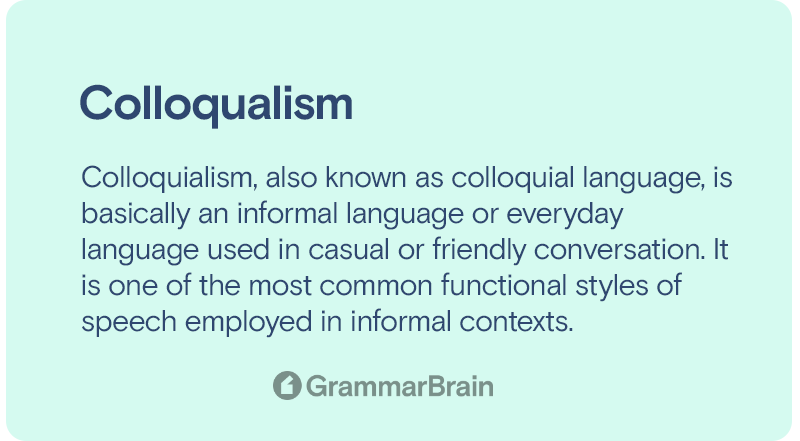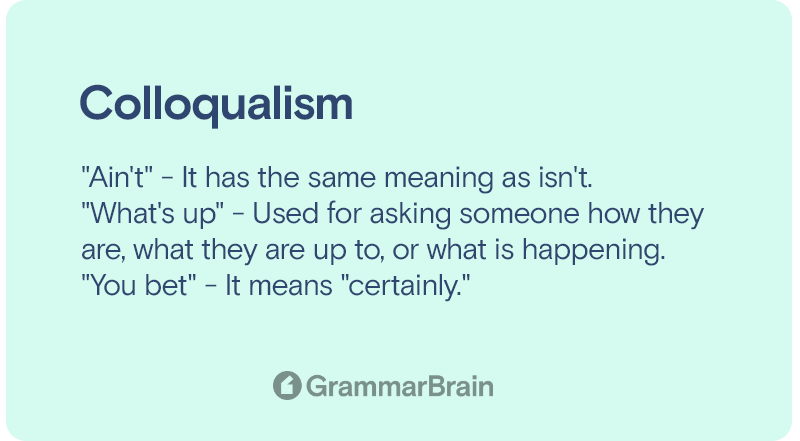What is colloquialism? How does it work? Is it another language? These are all adequate and proper questions that you may have when it comes to understanding colloquialism. To learn all about this unique device, continue reading.

What is colloquialism?
Colloquialism, also known as colloquial language, is basically an informal language or everyday language used in casual or friendly conversation. It is one of the most common functional styles of speech employed in informal contexts.
Colloquialism is also called “a regional or local dialect expression” or a “colloquial expression.”

What are the significant features of colloquialism?
Colloquialisms can often be found in conversations between friends, colleagues, and family. People use them in texts, journal entries, or letters to their loved ones. Colloquial language is the opposite of formal language and is usually a common part of a person’s everyday speech.
Common examples of colloquialism include words like “wanna,” “gotta,” “ain’t,” “rain check,” etc.
Colloquialisms are one of the most interesting elements of the English language. They are region-dependent and often change with the change in dialect. If used correctly, colloquialisms can help writers in making their work more emotionally appealing to the readers of a particular region.
Let’s have a look at some major features of colloquialism:
1. Colloquialisms are region-dependent
One of the most unique qualities of colloquialisms is that they depend on the language used by the regional population. Depending on geographical locations and the people living there, colloquialisms keep on changing.
2. Colloquialisms are very diverse
Since colloquialisms are region-dependent, they are incredibly diverse in nature. Every country, region, or city has its own colloquialisms with unique meanings that only the people living there relate to.
For example, the colloquial phrase “it’s raining cats and dogs” refers to heavy rainfall almost everywhere in the world. But people living in the State of Louisiana use the phrase “it’s raining monkeys” to say that it is raining heavily outside.
Some other common colloquialisms used in America include words and phrases like:
- “Ain’t” – It has the same meaning as isn’t.
- “What’s up” – Used for asking someone how they are, what they are up to, or what is happening.
- “You bet” – It means “certainly.”
- “Same here” – It means “the same applies to me.”
- “Rain check” – It is a colloquialism used for rescheduling a plan for a later date.
On the other hand, Canada has its own set of colloquialisms. Some major ones include:
- “Clicks” – It is used to denote kilometers.
- “Darts” – They mean cigarettes.
- “Double-double” – Refers to a coffee with double sugar and double cream.
3. Colloquialisms are different across different dialects
Another distinct feature of colloquialisms is that they differ according to the English dialects. For example, American English, British English, Australian English, and Canadian English are all forms of the English language. However, they are not the same.
They have different nuances, spellings, and thus, different colloquialisms. Even the same word has a different meaning in these countries.
For example, the word “pant” is used to represent underwear in British English while it represents trousers in American English. Similarly, “fries” in America are equal to “chips” in Australia.
Are colloquialisms, slang, and jargon the same?
Colloquialisms, slang, and jargon are often confused to be the same. While all three of them are types of speech and writing styles, there are several differences that set them apart from one another.
Let’s have a closer look at all three of them:
- Colloquialisms: Basically, colloquialisms are words and phrases that are used in informal or everyday language. They are used by people of a specific region and are different across different dialects.
- Slang: Slang words are highly informal in nature and are created by specific social or cultural groups. The most unique thing about slang words is that they can only be traced to small groups of people. The major difference between colloquialisms and slang words is that while colloquialisms are defined regionally, slang words are defined culturally. Some common slangs include words like “lit,” “hangry,” “flex,” “slay,” and more.
- Jargon: Jargons are technical words that majorly belong to a specific profession, academic discipline, or trade. They differ from colloquialisms and slangs in the sense that while they are used in informal writing, jargon words are used in formal and academic writing. For example, there are medical jargons like abscess, benign, anti-inflammatory, etc. that ordinary people can’t understand easily.
When are colloquialisms helpful?
While colloquialisms are generally used in informal speech and writing, they can help writers in several ways. Here are some cases where colloquialisms can be incredibly useful:
- They give life to a boring piece of literature: Since colloquialisms are informal words and phrases, they can be used to make a plain and boring piece of writing interesting.
- They help the writers in connecting with the audience: When used for a long period, colloquialisms become an inseparable part of a region. When writing for a specific audience, using colloquialisms can help the writer in connecting with the readers on an emotional level. It makes the story, article, or whatever piece the writer is writing more relatable to the audience. For example, the widely celebrated author Agatha Christie frequently used French colloquialisms in her work.
- It helps in building characters in fictional writing: When writing a fictional story or a novel, using colloquialisms can help in building the characters and making them more authentic. For example, if a character is based in Scotland, using Scotland-specific colloquialisms can help the writer in highlighting their background and enhancing their character.
Thus, unless a writer is specifically writing in a formal tone or for an academic purpose, using colloquialisms can bring life to a simple piece of work.
FAQs
1. How does colloquialism work?
As discussed above, colloquialisms are region-specific words and expressions used informal speech and writing. People generally use colloquialisms in texts or when they talk to their friends, neighbors, or loved ones.
In the English language, colloquialisms work by creating a sense of authenticity and closeness. They make the writing emotionally appealing so that it has a better chance of connecting with the audience.
2. What are examples of colloquialisms?
Since colloquialisms differ from region to region and from dialect to dialect, there are innumerable colloquialisms. Some common examples include the following:
a) Examples of British colloquialisms
- Bloke – A man
- Blimey – A reason for surprise/ a surprising element
- Cheeky – A bold person
- Boot – The trunk of a vehicle
- Posh – Something that is incredibly luxurious or fancy
- Dog’s dinner – It is a phrase used for a chaotic or a very untidy situation
- Knackered – It is used to express that a person is exhausted
b) Examples of American colloquialisms
- Ballpark – a statement that is very close to reality/ an almost true statement
- Score – To accomplish your goals
- Riding shotgun – To travel on the front passenger seat of a car, jeep, or truck
- Wheels – A vehicle
- Looker – A compliment used for an extremely good-looking person
c) Examples of Australian colloquialisms
- Cobber – A very good and close friend
- Bludger – A lazy person
- Mongrel – An extremely irritating person
- Furphy – Things that are false/ gossip or rumors
- Arvo – Afternoon
d) Examples of Canadian colloquialisms
- Chirping – To insult or mock someone
- Eh – An expression used to agree to something
- Gon show – A messy situation that is no longer under the control of anyone
- Click – Used to describe one kilometer
- Skid – A kid belonging to an extremely poor family
Sources:
- Wikipedia – Colloquialisms
- Merriam-Webster Dictionary – Definition
- Grammarly – Colloquialisms: Definition and examples
- MasterClass – What Is a Colloquialism
Inside this article
Fact checked:
Content is rigorously reviewed by a team of qualified and experienced fact checkers. Fact checkers review articles for factual accuracy, relevance, and timeliness. Learn more.
Core lessons
Glossary
- Abstract Noun
- Accusative Case
- Anecdote
- Antonym
- Active Sentence
- Adverb
- Adjective
- Allegory
- Alliteration
- Adjective Clause
- Adjective Phrase
- Ampersand
- Anastrophe
- Adverbial Clause
- Appositive Phrase
- Clause
- Compound Adjective
- Complex Sentence
- Compound Words
- Compound Predicate
- Common Noun
- Comparative Adjective
- Comparative and Superlative
- Compound Noun
- Compound Subject
- Compound Sentence
- Copular Verb
- Collective Noun
- Colloquialism
- Conciseness
- Consonance
- Conditional
- Concrete Noun
- Conjunction
- Conjugation
- Conditional Sentence
- Comma Splice
- Correlative Conjunction
- Coordinating Conjunction
- Coordinate Adjective
- Cumulative Adjective
- Dative Case
- Determiner
- Declarative Sentence
- Declarative Statement
- Direct Object Pronoun
- Direct Object
- Diction
- Diphthong
- Dangling Modifier
- Demonstrative Pronoun
- Demonstrative Adjective
- Direct Characterization
- Definite Article
- Doublespeak
- False Dilemma Fallacy
- Future Perfect Progressive
- Future Simple
- Future Perfect Continuous
- Future Perfect
- First Conditional
- Irregular Adjective
- Irregular Verb
- Imperative Sentence
- Indefinite Article
- Intransitive Verb
- Introductory Phrase
- Indefinite Pronoun
- Indirect Characterization
- Interrogative Sentence
- Intensive Pronoun
- Inanimate Object
- Indefinite Tense
- Infinitive Phrase
- Interjection
- Intensifier
- Infinitive
- Indicative Mood
- Participle
- Parallelism
- Prepositional Phrase
- Past Simple Tense
- Past Continuous Tense
- Past Perfect Tense
- Past Progressive Tense
- Present Simple Tense
- Present Perfect Tense
- Personal Pronoun
- Personification
- Persuasive Writing
- Parallel Structure
- Phrasal Verb
- Predicate Adjective
- Predicate Nominative
- Phonetic Language
- Plural Noun
- Punctuation
- Punctuation Marks
- Preposition
- Preposition of Place
- Parts of Speech
- Possessive Adjective
- Possessive Determiner
- Possessive Case
- Possessive Noun
- Proper Adjective
- Proper Noun
- Present Participle
- Prefix
- Predicate



